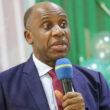The Association of Telecommunication Companies of Nigeria (ATCON) has expressed concern about the financial strain on telecom operators, warning that without a tariff adjustment, the sector may struggle to grow.
ATCON President, Tony Emoekpere, addressed the issue in a phone interview with the News Agency of Nigeria in Ibadan. He acknowledged that many Nigerians are worried about the impact of higher telecom tariffs, given the country’s economic difficulties.
However, he noted that the increase is necessary to sustain and improve the nation’s digital infrastructure.
“For years, telecom operators have operated under immense financial strain due to foreign exchange fluctuations, high energy costs, multiple taxation, and rising infrastructure expenses,” Emoekpere explained.
He pointed out that these challenges have made it harder for telecom companies to expand their networks, improve service quality, and bridge the digital divide. Without a price adjustment, Nigeria’s telecom sector could stagnate, limiting the country’s ability to compete globally in the digital economy.
Emoekpere further noted that the increase is not just about raising prices but ensuring that there are enough resources to enhance service quality. He explained that the additional revenue would allow telecom companies to expand 4G and 5G coverage, in underserved areas. He noted that the tariff hike would also lead to the upgrade of network sites, improving reliability and broadband speeds. This, he said, would benefit various sectors such as businesses, education, fintech, telemedicine, and other critical digital services.
“At the end of the day, the success of this move will be measured by real and tangible improvements in quality of service with faster internet speeds, fewer dropped calls, and wider coverage, leading to the digital transformation we all desire. That is the ultimate goal, and the telecom industry is fully committed to delivering on this promise,” Emoekpere stated.
He also pointed out that the Global System for Mobile Communications Association (GSMA) has recognized the importance of sustainable pricing for long-term network investments. While the tariff increase is necessary, Emoekpere noted that there are still other pressing challenges within the industry that must be addressed to support Nigeria’s digital transformation.
He called on the government to simplify Right of Way permits to speed up fiber deployment and to enforce protections for Critical National Information Infrastructure to prevent vandalism of telecom assets.
Additionally, he stressed the need to reduce the multiple layers of taxation that telecom operators face at federal, state, and local levels. Providing incentives for rural broadband expansion, he noted, would also be crucial in ensuring digital inclusion for all communities.
Despite the challenges, Emoekpere noted that some progress has been made, citing the recent resolution of the USSD debt issue as an example. He expressed optimism that the current administration would continue making strides in resolving these industry concerns.
However, he also reminded telecom operators that consumers have the right to expect better services. “The tariff increase should come with a visible improvement in quality: faster speeds, wider coverage, and greater reliability. From all indications, the telecom operators are geared toward meeting these expectations, and the NCC has set clear quality service targets,” he said.










